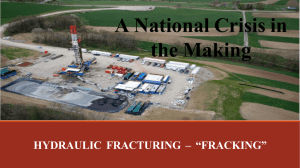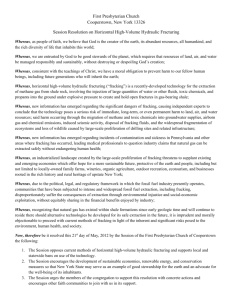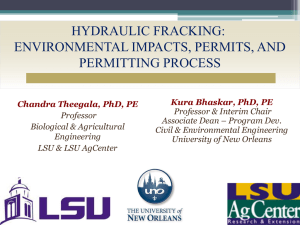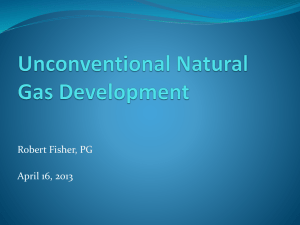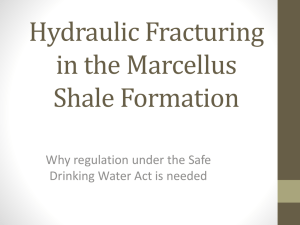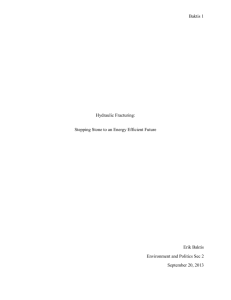UN Environmental Programme
advertisement
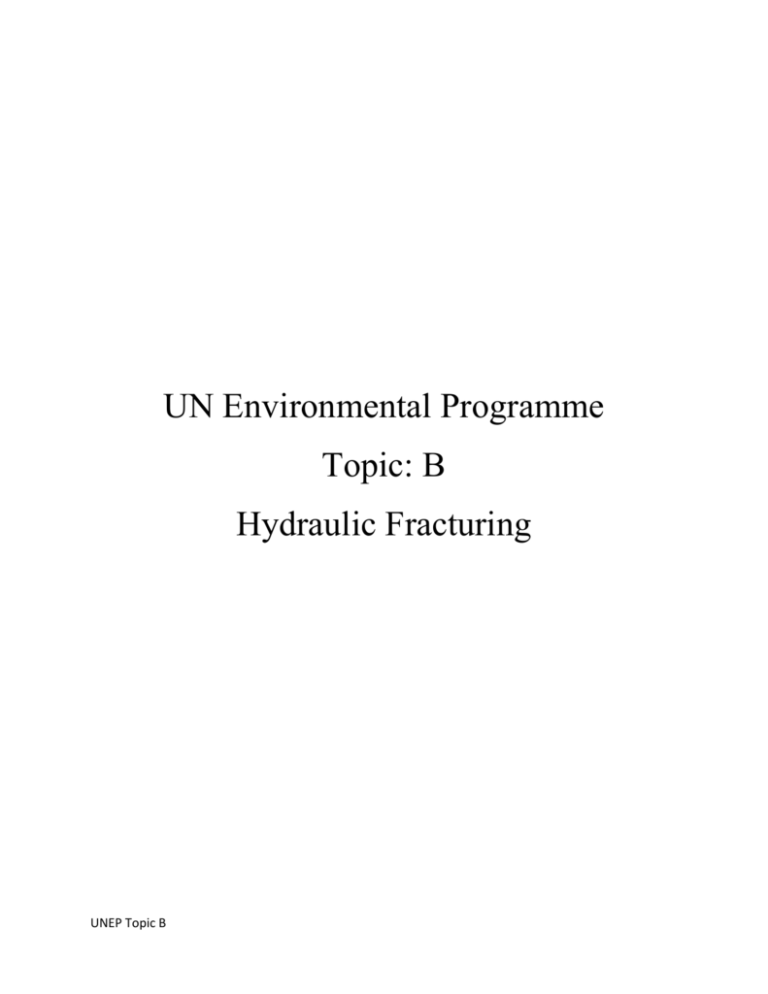
UN Environmental Programme Topic: B Hydraulic Fracturing UNEP Topic B Submitted by: Brazil Committee: UNEP School: Lincoln-West High school Delegates: Nishimwe Sosthene and Treywon Maddox Topic B: Hydraulic Fracturing Around the world, hydraulic fracturing is a national issue. Brazil has the 10th largest reserves of technically recoverable shale gas in the world. Hydraulic fracturing was a main factor in those reserves. Some experts speculate that hydraulic fracturing may be connected to earthquake occurrences. It is believed that the earthquake resulted because the fracturing fluid was pumped into a small fault line. Hydraulic fracturing involves pumping a mixture of water, sand, and chemicals into shale to extract the natural gas. The Brazilian legislature is considering a bill that would ban hydraulic fracturing for five years while the government studies the potential impact of the practice. The legislation was originally introduced in December 2013 following the National Oil Agency’s (ANP) sale of land in the five onshore oil and gas basins to domestic and international bidders, but has gained momentum in recent weeks. ANP estimates that the Brazilian basins may hold up to 515 trillion cubic feet of oil and gas reserves. Government officials anticipate the legislature will vote on the bill in 2015. Brazil wants to pass a five year ban on hydraulic fracturing. Brazil believes that it is best to do so to ensure safety. If the ban is passed the government will experiment the factors of “fracking”. This bill will be voted on in 2015. Brazil would like to use hydraulic fracturing if it is stable. Hydraulic fracturing or fracking creates fractures in the shale formation to release the gas. A fracturing fluid is pumped under high pressure (ca. 100 bar) into the drilling pipe to widen fractures in the rock or to create new ones. The fluid consists mainly of water. Brazilian regulators have put in place rules to govern the use of hydraulic fracturing. The National Petroleum Agency (ANP) said in a statement that fracking must not harm the environment and announced that it has issued several new regulations to ensure groundwater sources are protected. “Fracking ensures that the age of oil-and it's princely hydrocarbon cousin, the natural gas molecule-will not end because we have run out of fossil fuels. But it may end because burning these wonderful fuels puts the planet farther down a path we don't want to head down” ― Russell Gold Work cited page http://oilprice.com/Latest-Energy-News/World-News/Brazil-Issues-Fracking-Regulations.html https://www.goodreads.com/quotes/tag/fracking http://fracfocus.org/ UNEP Topic B China St.Vincent St.Mary High School Bridget Neugebauer & Aaron Kofksy Hydraulic Fracturing is a controversial method of today’s world that is used to create a source of natural energy. This system of removing natural gases from the ground is detrimental to the environment and therefore has raised many concerns from environmentalists. Hydraulic fracturing, also known as “fracking”, is the invasive process of extracting unconventional gas—gas trapped in insufficiently permeable rock formations-- from the earth by pumping millions of gallons of water, sand, and chemicals into the earth. This technique was developed in response to the need to exploit unconventional energy sources as a result of depletion of fossil fuels, the world’s main source of energy. Despite the considerable economic and energy security benefits, fracking has so many environmental hazards that there should be consideration of whether or not a country should allow fracking. These environmental hazards are as follows: excess hydro waste, tectonic stress (thought to cause earthquakes), contamination and pollution brought by fracking waste disposal, biodiversity losses and landscape disruption, as well as generation of considerable green house gases (GHG) emissions. The United Nations Environmental Program is working in cooperation with China and the State Environmental Program Administration (SEPA) to implement programs in environmental assessment, law, education and training, management, technology transfer, innovation and natural disaster protection. Previously, in China, coal was the main source of energy. This dependency on a fossil fuel created many problems: coal could not be replenished and created such harmful gas emissions that a different solution to the energy requirements in an expanding economy and population was approached. A push to bring hydraulic fracturing to China was decided on. In response to the environmental concerns of fracking, China developed the twelfth Five Year Plan with goal to protect the environment, and increase energy efficiency. China is also working with the Global Environment Facility, UNEP Topic B an international fund to address climate change, biodiversity, land degradation, transboundary water, and chemical management issues. As a result of these measures, the electricity use in China has been slightly alleviated. Plans to begin fracking in the Longmensham mountain range were introduced in 2013. This area, having previously suffered an earthquake is not in favor of this program. Fracking is thought to create tectonic stress; over time, this could induce tremors in an already highly sensitive area. Additionally, the enormous amount of water needed for fracking has placed a strain on the already limited water supply that needs to meet the needs of the largest nation in the world. Many villagers lost their land to the fracking demands and developed concerns for their families whose health was affected by leaks in the fracking piping. China would benefit from an improvement in methods of hydraulic fracturing to prevent environmental and health concerns. One solution to these problems is to avoid areas of water scarcity to avoid depleting an already strained supply. Another answer to these problems is the provision of rigorous training and extensive oversight to prevent leaks and spills that contaminate local water supplies. Another method that could also be used to prevent leakage into underground water supplies is injection wells designed to minimize risk of corrosion by carbon dioxide. Additionally, monitoring and enforcement procedures and the creation of funds for the restoration of fractured lands could be created to maintain and upkeep the quality of the land. Given the uncertainty in terms of public health concerns, environmental issues, and depletion of water resources, the continued development of unconventional gas reserves is an option which brings with it a great responsibility. Action must be taken to improve or eradicate these issues. UNEP Topic B "Fracking: Can We Safely Squeeze the Rocks?" UNEP.org. United Nations Environmental Program, Nov. 2012. Web. 1 Nov. 2014. "Fracking and China's Energy Revolution - China Digital Times (CDT)." China Digital Times (CDT). N.p., n.d. Web. 17 Nov. 2014. UNEP Topic B
